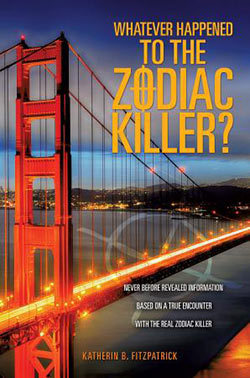Peter Lopez Jr.'s Blog: Xulon Press Blog , page 45
September 21, 2014
Xulon Press displays 740 individual titles at the Christian Product Expo
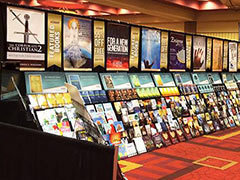 Over 150 buyers attended the Christian Product Expo in Murfreesboro, Tennessee this September. Xulon Press was pleased to display 740 individual titles. Our booth was the largest at the expo measuring 80′ long. The CPE Edition of the Christian Book Browser Catalog was placed in every buyers gift bag and handed out at the reception. Many bookstores shopping the booth commented on how they already carry several local Xulon Press authors in their stores, and several have set up books signings as well. As the show continued, representatives from newer stores came by asking how to receive the catalog and placed orders with our team.
Over 150 buyers attended the Christian Product Expo in Murfreesboro, Tennessee this September. Xulon Press was pleased to display 740 individual titles. Our booth was the largest at the expo measuring 80′ long. The CPE Edition of the Christian Book Browser Catalog was placed in every buyers gift bag and handed out at the reception. Many bookstores shopping the booth commented on how they already carry several local Xulon Press authors in their stores, and several have set up books signings as well. As the show continued, representatives from newer stores came by asking how to receive the catalog and placed orders with our team.
CPE is a buying show held twice a year for member stores of the Munce marketing group. These events have anywhere from 80-100 vendors and differ from other U.S. based shows attended by Xulon Press such as the International Christian Retailing Show (ICRS) and BookExpo America (BEA). At CPE, buyers who visit a certain number of booths for vendor presentations and make purchases actually have their travel and lodging expenses reimbursed by the show. This is a great way for stores to see the latest products and vendors to be guaranteed sales during this event.
The next CPE event will be held in January of 2015. If you would like to reserve a placement for this please call our Marketing Specialist at 1-855-519-1660!
Here are a few photos from the 2014 Christian Product Expo. Visit our Facebook page for a full gallery of photos from the event.






The post Xulon Press displays 740 individual titles at the Christian Product Expo appeared first on Xulon Press, Christian Self Publishing.
September 13, 2014
The Weight of the Exclamation Point
Since I started here as an editor at Xulon Press, nearly eight weeks ago, I have read at least one hundred manuscripts. Almost every manuscript I have edited and reviewed has been nonfiction. They have all been unique in their focus, voice, and message, but almost all of them have contained at least one “common writing error” that I usually have to suggest needs to be changed.
The top three “common writing errors” I personally have picked up on are as follows (in no particular order): overusing the exclamation point, writing words/phrases in all capital letters, and misplacing of the semicolon. So, let’s start with the overuse of the exclamation point.
We all learned about the exclamation point at some point in our lives – when to use it, when to not use it, when it’s appropriate, and when it’s not appropriate. We know that it is used to convey emotion, excitement, or an actual – get this – exclamation. However, a lot of writers will misuse the exclamation point to the point of wearing out its emphasis.
Think of each exclamation point as a block of weight, each representing thirty-three percent of the allotted weight for all exclamation points within your book. If they are each worth thirty-three percent, which means that there are a total of three exclamation points that can be distributed among your book. Not three per page, not three per paragraph, please not three per sentence, but three throughout the entire manuscript. Distributed equally, they will each properly represent their portion of the total weight that they’re allotted and balance out the manuscript. If more are added, the emphasis actually decreases because the exclamation points have begun to lose their weight.
Keep the exclamation points to three per manuscript; use them only when absolutely necessary, and remember that their weight accounts for a lot more when they’re used correctly. A correctly placed exclamation point goes further than any misused or overused exclamation point.
The post The Weight of the Exclamation Point appeared first on Xulon Press, Christian Self Publishing.
September 8, 2014
Xulon Press author talks about her book “Whatever Happened to the Zodiac Killer?” on ABC News Washington
Whatever Happened to the Zodiac Killer?
Never Before Revealed Information Based on a True Encounter With the Real Zodiac Killer
by Author Katherin B. FitzPatrick
So, whatever happened to the Zodiac Killer who haunted the San Francisco Bay Area from 1969 to the night of his sudden disappearance in 1978? He cleverly manipulated and taunted the emotions of the public through the newspapers, and mocked and scorned the police he called “The Keystone Cops” and the “Blue Meanies.” He egotistically announced, “You will never capture me!” It seemed that he was right. The Zodiac always had the “Phantom advantage” in every circumstance, and escaped. He was definitely one of the most demonic individuals on earth, as he spoke often in his letters to the public and the police about “the monster within me . . . I cannot stop!”
One night a couple who had just gotten out of a late night church service suddenly encountered him. They ultimately wound up getting into a high speed chase with him. When it was between him and this couple, and ultimately their family, a supernatural occurrence happened! Based on a true story and actual events!
Katherin (“Kathie”) FitzPatrick has been a professional level writer since her high school years. In her adult life this led to a long career as a television producer, writer and on-camera talent for a prominent Christian television network in the San Francisco Bay Area. Currently, she is working in Real Estate and income properties and is an entrepreneur. She resides in the Pacific Northwest with her family, and participates in various ministry ventures.
The post Xulon Press author talks about her book “Whatever Happened to the Zodiac Killer?” on ABC News Washington appeared first on Xulon Press, Christian Self Publishing.
September 3, 2014
Xulon Press Successful Author Spotlight: Phinehas Kinuthia
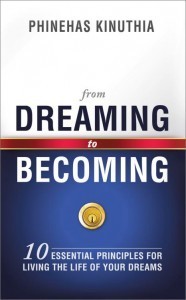 Our Xulon Press Successful Author Spotlight today features pastor, international speaker, author, educator, mentor, leader, and entrepreneur Phinehas Kinuthia, who pastors Global Enlightenment Center Church in Houston, Texas, along with his wife Joyce and their daughter Claire. His book “FROM DREAMING TO BECOMING – 10 Essential Principles for Living the Life of Your Dreams” has been endorsed by Dr. Myles Munroe, who wrote:
Our Xulon Press Successful Author Spotlight today features pastor, international speaker, author, educator, mentor, leader, and entrepreneur Phinehas Kinuthia, who pastors Global Enlightenment Center Church in Houston, Texas, along with his wife Joyce and their daughter Claire. His book “FROM DREAMING TO BECOMING – 10 Essential Principles for Living the Life of Your Dreams” has been endorsed by Dr. Myles Munroe, who wrote:
“This exceptional work by Phinehas Kinuthia is one of the most profound, practical, principle-centered approaches to the subject on fulfilling your dreams I have read in a long time. The author’s approach to this timely and critical issue of leadership brings a fresh breath of air that captivates the heart, engages the mind and inspires the spirit of the reader. From Dreaming to Becoming is destined to become a classic and touch many lives.”
Pastor Phinehas was born in Kenya, Africa, a premature baby, only weighing 2.6 lbs. His Mom was given the option to abort her pregnancy by doctors, but his Mom chose him over her own life. Phinehas stated, “When I came out, it was like I was almost a still born. I was able to fight for my life. I developed chronic bronchitis and asthma. I couldn’t play soccer and games, I had to stay on the sideline and watch the kids play. I was not able to play like the other kids. I would watch other kids play.”
“As a boy, it messed up my self-esteem. I grew up as a sickly child, in and out of the hospital. I once had typhoid and malaria and asthma. Doctors prescribed something that paralyzed me for half a day. My Mom carried me on her back. I came from a poor family. Mom was a teacher. Dad was a cab driver. I was 14 yrs old and cried all the way home walking from the hospital. My Mom got to know the Lord first. She prayed us all into salvation. We held hands and prayed that God would heal me of asthma and bronchitis and paralysis. The change in my life happened when someone gave me a VHS tape of ‘Hidden Glory and Purpose by Design’ by Pastor Myles Munroe.”
Phinehas continued, “I listened to this message and it made me start to believe in myself. I had a reason for being. God had a purpose for my life. There were a lot of similarities in my life and Pastor Myles’ life. I started dreaming and pursuing my dreams and believing that there was more to my life, that there was greatness and that I could make a difference. They used to say, “I want to be a man that they would write about”—that made a difference in me. I got connected to Pastor Myles when I came to the USA. I came with about $200 and went to Virginia to school that costs $20k. My first month, my $200 was finished. I was homeless for about a month, sleeping at the library, and with friends.
In 2007, I started this journal. Woke up and wrote about 80 points that became the bedrock of this book. When I finished this book, I wrote to Dr. Myles, even though I had never met him—I just prayed over it. I got an email from Dr. Myles. He said that he read the book and really thought that is was phenomenal. I met him when he came to Houston. And I have met him several times since—he has become a mentor to me.”
As we began our conversation, I asked Phinehas “What one past experience changed the course of your life?” He responded “The childhood moment of being sick and the VHS of Dr. Myles and the transition of moving to USA. It was a paradigm shift of life.”
Delving into his writing style, I asked, “What method do you use to start your writing process?” Phinehas shared “80 points. I have moments when the Spirit of God just moves me. For the most part, I write at night. I am up until 1 or 2am. I write at that time, after the family has gone to sleep. Sometimes God will put a statement or I will hear something drop in my spirit…I will pull over while driving to take notes or I will send myself a voicemail to remember me what the Spirit put in my heart. I write in moments when the Spirit inspires me. I might write 10 pages continuously and pour my heart into it. I wrote this book to connect to someone who is looking for a mentor. It has opened doors for tremendous relationships that I would never have contracted in my life. For example, a friend of mine took our book to a German girl who was in depression and on medicine. The book turned the girl around. She got out of her depression. She told me that it turned her around. She is now going to college for art and dance. True success is not in what you accomplish—it’s in doing for what you were created to do. Being at the center of God’s call and fulfilling His calling on your life.”
Feeling inspired by Pastor Phinehas, I asked him “What message do you want shared by the story of your life?” He responded “My own life story. Regardless of your past, each one of us deserves the right and ability to dream. We cannot allow others’ interpretation of success to drown us out of the success that God has for us. We all have treasure hidden in ordinariness. Many have just discovered their potential. Help people unlock their potential. Awakening potential and awakening the dream-ability.”
Wanting to explore how he would inspire others, I asked “What would you tell others about your relationship with Christ that would inspire them?” Pastor shared “Without Christ you have nothing. Nothing matters without Him. Everything has to revolve around that– even finding purpose. Even Christ dying for us (2Timothy 1:9) He has saved us according to grace and purpose. God wanted to restore us out of our fallen nature. Until you are connected to our maker, you are dead. Draw nigh to me and I will draw nigh to them. Christ is everything. You have to find Christ. When you find Christ, everything else builds from that.”
Asking him what has become my signature question “What will they write on your gravestone that will sum up your life?” Pastor Phinehas reflected and then responded “A man who really loved the Lord first and did all he could and the best he could for his family and birthed the destinies for other people.”
Sensing that Pastor had a message for his generation, I asked, “What message do you believe God is asking you to share with your world?” He responded with exuberance “Equipping others to birth their destiny. 2 words: enlighten and empower. What the word say about who you are and not what does the world say? Add to your faith, each were given a measure of faith, but you can grow it. Equipping and empowering is how we can equip people. I wrote a workbook for those who want to know how they get from concept to reality– Putting the steps together. It is the principle of association. You can grow your life exponentially in relationships. Significant people in my life have helped me bridge from one area of my life to another.”
Wanting to find out where he draws inspiration, I asked, “What inspires you?” Pastor Phinehas spoke with resolve as he shared “My purpose. There is a drive to my purpose. I used to work at a law firm. But I could not do that anymore. My passion. You cannot accomplish a dream without passion. Also, to see the effect that I have had in equipping and empowering others. God has helped me to help others. It comes down to: Passion, purpose and the Word.”
I asked Pastor “What would be your WAKE UP Call for your generation?” He became alive with excitement as he spoke “Our generation doesn’t understand the magnitude of the responsibility laid on us. We take things very lightly. But our predecessors paid a price for going for us. My heart bleeds for our children. We have to lay a foundation so they will continue the legacy. Elijah passed on a double portion onto Elisha but when Elisha died, it died with him. It was in his bones. Our generation needs to understand the responsibility that we have to carry this to our next generation. We take for granted too much. We have a responsibility to pay the price like those before us. Paying the price through process. The process is as important as the promise.”
Sensing his deep connection to the Word, I asked “What is your theme scripture and why?” Pastor shared his favorite scripture “Philippians 3:14 I do not count myself to have apprehended, I press toward the high mark. It is important to lead with the future in mind. God is doing a new thing. That brings life and expectation. It brings hope. Lamentations says there is hope for a tree cut down that though it withers, it will sprout again.”
As we drew to a close our spirited, passion filled conversation; I simply asked Pastor Phinehas “When you get to Heaven, what do you want to hear your Lord and Savior say?” He got quiet for a moment and then said, “Well done good and faithful servant and that you fulfilled your assignment. I want to die empty. Fully give all that I have each and every time. David served his generation and then he rested.”
I have to admit his story was inspiring. From this premature 2.6 pound baby from Kenya, whom the doctors tried to persuade his mother to abort, to a chance discovery of a VHS tape in Kenya from Dr. Myles Munroe, this life was destined to speak of God’s grace and glory, His power and passion, about equipping and empowering others to rise above from whatever circumstance you were born into and set your sights on your destiny in Christ. Pastor Phinehas reminds us all that you are not what your surroundings dictate.
If you dare to dream and have the determination to make your dreams come true, you can be someone who inspires and mentors others to dream also. Pastor Phinehas reminds us “We all have treasure hidden in ordinariness” – that is a comment that inspires all on its own!
The post Xulon Press Successful Author Spotlight: Phinehas Kinuthia appeared first on Xulon Press, Christian Self Publishing.
August 28, 2014
Meet the Team: Amanda Wright’s Design Work Packs Quite the Punch
 It was a “leap of faith” as she calls it, but Xulon Press’s Amanda Wright knew that God was calling her to the Sunshine State, from Pennsylvania, to become part of our graphic design team in December of 2009. Her work has spoken for her, as she and our other gifted graphic designers have inspired authors and readers alike with their professional cover designs and video trailers. Yet creating impressive cover designs and trailers is not all Amanda is passionate about, which she shares in an exclusive interview.
It was a “leap of faith” as she calls it, but Xulon Press’s Amanda Wright knew that God was calling her to the Sunshine State, from Pennsylvania, to become part of our graphic design team in December of 2009. Her work has spoken for her, as she and our other gifted graphic designers have inspired authors and readers alike with their professional cover designs and video trailers. Yet creating impressive cover designs and trailers is not all Amanda is passionate about, which she shares in an exclusive interview.
1) What is your title at Xulon Press? Describe what a typical workday is for you, such as what your duties are.
I’m a graphic designer, and I am part of a team that is responsible for creating the cover designs for many of the books we publish here at Xulon Press. I use design software, including Adobe Photoshop, Illustrator, and InDesign to create the layout for each book. When I’m not designing book covers, I am busy making video trailers. Each video trailer includes a narrative script, images, and music that I then combine into a feature video that the author can use as a tool to market his/her book.
2) Besides Xulon Press, any previous jobs that have been impactful in your career?
After graduating college, my first design job was with R.M. Palmer, a chocolate manufacturer in Reading, Pennsylvania. My responsibilities included package design, color scheme and layout of initial products, and production of all new product mock-up samples. I worked for R.M. Palmer for two years; and in October of 2009, I decided I wanted to move to Florida.
There was a woman I met who owned a consignment shop in town and after meeting her, I started going to church with her; and she led me to accept Christ into my heart. Her twin sister lived in Florida and opened up her home to me when I decided to move. I took a huge leap of faith; I quit my job, packed up my car and headed on a road trip to the Sunshine State! This is when I realized God puts people in our paths for a purpose. Without these key people in my life, I wouldn’t be where I am today or doing what I’m doing. They are all Christians and, to me, that’s divine connection!
3) When did you become interested in fitness training? What led you to consider becoming a trainer?
My interest in fitness and exercise began when a friend asked me if I wanted to run a 5K. We began training together and ran our first 5K in April 2013.
4) You also competed in some fitness competitions and have done very well in them. Describe some of the most memorable competitions that you have been involved with.
It all began when I started attending boot camp classes at the complex where I live. One of the instructors asked if I was interested in competing in bodybuilding competitions. I had no idea what a bodybuilding competition was or what it involved, but after attending a show, I decided it was something I knew I could do. So I started working with a trainer. I was training six days a week, eating six meals a day and following a special diet. After twelve weeks of training, I placed fourth in my first competition in September 2013. I competed again one month later, and placed first and took the overall win in the women’s figure category! Behind every great competitor is a great coach, and my success in this sport would not be possible without the guidance and support of my trainer, who also happens to be a church pastor.
During a figure competition, the competitors appear on stage in high-heels and two-piece bikinis; each competitor executes a series of model poses and quarter-turns for a panel of judges, who assess the athleticism of their physique. A successful competitor has a great physique and, even more importantly, a great stage presence and personality.
5) What do you enjoy most about fitness training, and have you been able to inspire others to become fit and happy as well?
In the short time that I’ve been a competitor, I’ve noticed how I’ve inspired others to be more health-conscious and committed to making positive changes in their lives. As God puts people in my life to direct me, He also uses me as a role model to guide others on their fitness journey.
I became a certified trainer and now train clients on a part-time basis. I’m also training for my next competition. My goal is to become an IFBB Figure Pro. Being a competitor is a full-time commitment; it involves hard work, discipline, and dedication.
6) What have you learned from both of your current careers, being a designer and being a fitness trainer, to guide you towards your path in life?
Anything is possible when you trust God. Believe in yourself, work hard and never give up!
“When you realize God’s purpose for your life isn’t just about you, He will use you in a mighty way.” Dr. Tony Evans
The post Meet the Team: Amanda Wright’s Design Work Packs Quite the Punch appeared first on Xulon Press, Christian Self Publishing.
August 18, 2014
Typeface Alone Does Not a Book Make
 I have found myself writing in a diagnostic review, “A run-in head should be boldfaced and followed by an em-space before resuming roman text.” Then I have to go back and write it in English. I wouldn’t know those terms if I didn’t work in publishing, so why should you? In rereading the last year or so of Xulon blog posts, I discovered a glaring content omission: We haven’t really explained why we change some of the things we change in your manuscript.
I have found myself writing in a diagnostic review, “A run-in head should be boldfaced and followed by an em-space before resuming roman text.” Then I have to go back and write it in English. I wouldn’t know those terms if I didn’t work in publishing, so why should you? In rereading the last year or so of Xulon blog posts, I discovered a glaring content omission: We haven’t really explained why we change some of the things we change in your manuscript.
Now, I don’t mean grammar, punctuation, spelling, syntax, word usage, and other such linguistic rules taught in school and championed by the much-beloved dictates of The Chicago Manual of Style. I’m talking about the bits and bobs that give your text—your work of art, your message, your story, the results of your research, the meat—look so nice.
First, a no-nonsense bullet list of accepted usages. They may seem minor, but cumulatively they give your work that invaluable look of professionalism. This will be followed by a less mechanical overview of a couple-three best practices. “Scripture formatting one oh one” will follow, and we will end with a note about a very handy reference you might want to pick up.
Double space bands are no longer necessary. Just hit the spacebar once after full-stop punctuation (period, question mark, exclamation point), and your word processor of choice will insert the perfect amount of space.
A font (a word used interchangeably with typeface) is the style, size, and spacing of a set of characters; the way the letters, numbers, and punctuation marks look on your screen, and later, in your book. For our purposes, there are two kinds: serif and sans serif. (If your display prevents you from seeing the difference there, which does happen, the characters in a serif font have little horizontal ticks on all the end bits, whereas the sans version does not.) Serif seems easier to read, but many prefer the sans. Pick one that doesn’t make your eyes tired and use it proudly.
To indent or not to indent the first line of each paragraph
indent. It’s so much easier to read.
Use of typeface for emphasis:
underline
used almost exclusively by APA (American Psychological Association)
once required in place of italics in manuscripts submitted for publication
in a Web-connected world can be mistaken for hyperlink in e-documents
bottom line, don’t use it
boldface
use in chapter titles and subheads only. Should not be used to highlight quoted Scripture (see Scripture formatting one oh one, below.)
italics
use for words used as words (The word peevish means “easily irritated by unimportant things.”) Should not be used to highlight quoted Scripture (see Scripture formatting one oh one, below).
use to set off a word or phrase you want to emphasize. Note the difference in the way these two sentences sound—in fact, in they meaning they convey—when you emphasize the italicized part.
“Now you’re blaming me?”
“Now you’re blaming me?”
quotation marks, double
set off short passages of quoted Scripture (See Scripture formatting one oh one, below.)
indicate spoken dialogue
indicate ironic usage of a word or phrase (Rudolph had told us he was an expert skater. Just now, the “expert skater” was sprawled in the grass on top of a gushing sprinkler head.)
quotation marks, single
used for a quotation within a quotation (“Mom, Rupert said, ‘You told me, “I’ll take you to the park,” but now you won’t go.’ I confess he is correct.”)
in British English, often used instead of the double quotation marks of American English
No emoticons, texting shorthand, or ALL CAPS.
No emoticons, texting shorthand, or ALL CAPS.
hyphen ( – ) is used for compound words (The well-known actor Donald Duck…)
Here’s a freebie: The Chicago Manual of Style Hyphenation Table: http://www.chicagomanualofstyle.org/16/images/ch07_tab01.pdf
en dash ( – ) is used to indicate a range of pages, dates, ages, whatever
em dash ( — ) is a monstrously flexible and beautiful bit of punctuation
used to indicate a longer pause than that offered by a comma
used for adding explanatory information, sort of like parentheses
in dialogue, used to indicate a person being cut off in mid word or sentence
an alternate usage direct from the CMOS: “Will he—can he—obtain the necessary signatures?” asked Mill.
em space is used almost exclusively in academic work, but it’s useful if you want to add visual variety to any nonfiction piece.
use after a run-in head that introduces a section’s main topic
County Cork In 2011, the county’s population was 518,128 making it the second most populous of the counties in the state. County Cork is located in the province of Munster. It borders four other counties: Kerry to the west, Limerick to the north…
Early education The percentage of 3- to 5-year-olds in preprimary programs who attended full-day programs increased from 39 percent in 1990 to 60 percent in 2012.
A less technical perspective As important as the guidelines above are, we should give a brief think to a few more general best practices:
Balancing a conversational tone with being overly chatty can be tough. The former is welcome and makes readers feel like they’re listening to a trusted friend; the latter is distracting, and though it may be exactly how people talk, it detracts rather than enhances. Avoid direct address to the reader (brothers and sisters, people of God, dear ones). Avoid vocal placeholders, that is, things you say when you’re talking that you don’t even realize you’re saying: You know what I mean? Really? I was like…
If using vernacular is absolutely critical to your story, use it sparingly. Do not include every um, like, and you know. Also, be judicious with the phonetic spelling of words spoken with a foreign accent. A little is great and adds dimension to a character; too much obscures meaning and makes the reader work too hard.
Your word processor’s Spell Check function will find a lot but not everything; a he that should be the, for example, will slip by. Comb through one last time after correcting the errors Spell Check finds. As you’re doing so, you’ll likely notice things you want to change, usually inconsistencies you breezed past in the heat of composition. It works that way for writers.
Please note that the above guidelines barely touch on the most common elements and usages. There remain thousands of words that could expound on every one of these points.
Now, as promised, everything you wanted to know about Scripture formatting and citation but never before had a need to know:
Scripture formatting one oh one:
Name your primary Bible version on the copyright page, including appropriate copyright information. Then in the body of the work, it will be necessary to name only alternate versions; that is, if your main source is New King James Version, do not label a quotation from NKJV but only one from, say, AMP or NIV or MSG.
Names of books of the Bible should be spelled out in text and abbreviated in parenthetical citations.
Inline citation
“…spiritual hosts of wickedness in the heavenly places” (Eph 6:12 NKJV). [quotation marks and end punctuation after parenthetical]
In-text citation
Ephesians 6:12 (NIV) reads, “For our struggle is not against…”
First John 2:16 states, “For all that is in the world…” [Note that when such a book name begins a sentence, the book number is spelled out.]
Block quote (more than four lines)
sinful nature can never please God. (Rom 8:3–8 NLT) [no quotation marks, indented, left aligned, and end punctuation before parenthetical]
OR
sinful nature can never please God.
—Romans 8:3–8 NLT
[citation on a new line, right aligned, preceded by an em-dash]
Abbreviations of names of books of the Bible come in two versions; one uses a period, one does not, and for most books the abbreviation itself differs for each form. Some books have no abbreviation that uses the period (Ezra, for example, and Mark, Luke, James, and Titus; others have no abbreviation at all, such as Acts and Jude. [Job can, in fact, be abbreviated.])
Any font formatting (italics, underline, boldface) not present in the original Bible text must be accompanied by [emphasis added]. Best practice is to keep such emphasis to a bare minimum.
Outside of severely academic work, it is not necessary to include verse numbers in quoted passages.
1 Therefore, there is now no condemnation for those who are in Christ Jesus, 2 because through Christ Jesus the law of the Spirit who gives life has set you free from the law of sin and death. 3 For what the law was powerless to do because it was weakened by the flesh, God did by sending his own Son in the likeness of sinful flesh to be a sin offering. And so he condemned sin in the flesh, 4 in order that the righteous requirement of the law might be fully met in us, who do not live according to the flesh but according to the Spirit.
(All boldfaced, strikethrough numerals above should be deleted.)
The bonus bit: We’ve recently purchased several copies of The Christian Writer’s Manual of Style, a volume of writing guidelines enormously beneficial for we and thee. It’s less costly than The Chicago Manual of Style and covers most of the pertinent material and even some not included in the CMS. (It must be noted, however, that the pair differ on some issues, and in such cases we default to the Chicagoans’ literary views.) Pick yourself up a copy, and buy one for a friend. You will not regret it.
Failing all else, ask us. After all, what is an editor of whom writers do not ask questions? Unemployed.
The post Typeface Alone Does Not a Book Make appeared first on Xulon Press, Christian Self Publishing.
August 15, 2014
Pastor/Author Bob Franquiz talks about Xulon and the importance of a publishing partner
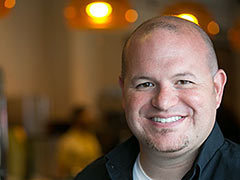 “I have this belief: every Pastor should write. Pastors research most topics more than the average writer. We preach on subjects for years and have a depth of knowledge that most would love to have before they begin writing a book. Bottom line: Pastors were born to write. When I was writing my first book, I didn’t know what I was doing. So I did everything myself and the process took twice as long and cost me twice as much. Seven books later, I realize the importance of a publishing partner to take your writing to the next level. As you write your first book, you need a partner like Xulon Press. They will save you from many of the headaches and heartaches associated with publishing. These guys care about your message and your success as a writer. They believe writers have a message to share. This incredible team wants to help you get that message out of your head and onto the written page. I wish I had them in my corner when I was getting started; you’ll be glad you have them in yours.”
“I have this belief: every Pastor should write. Pastors research most topics more than the average writer. We preach on subjects for years and have a depth of knowledge that most would love to have before they begin writing a book. Bottom line: Pastors were born to write. When I was writing my first book, I didn’t know what I was doing. So I did everything myself and the process took twice as long and cost me twice as much. Seven books later, I realize the importance of a publishing partner to take your writing to the next level. As you write your first book, you need a partner like Xulon Press. They will save you from many of the headaches and heartaches associated with publishing. These guys care about your message and your success as a writer. They believe writers have a message to share. This incredible team wants to help you get that message out of your head and onto the written page. I wish I had them in my corner when I was getting started; you’ll be glad you have them in yours.”
Bob Franquiz
Senior Pastor, Calvary Fellowship
Founder, Church Ninja
Author, Pull: Making your Church Magnetic
About Bob Franquiz
Bob Franquiz is the Founding and Senior Pastor of Calvary Fellowship in Miami, FL. Bob is also the founder of churchninja.com, an organization that provides training and resources to Pastors and Church Leaders. He is the author of seven books, including Pull: Making your Church Magnetic and Begin: First Steps for the Journey of Faith. Prior to entering Pastoral ministry, Bob played guitar for Christian Hardcore band Strongarm; a band that has been called one of the best Christian Metal bands of all time. Pastor Bob also served as the dean of Calvary Chapel Bible College in South Florida. Most importantly, Bob considers his greatest achievement as being married to his “just out of high school” sweetheart, Carey, for the last 16 years. Together, they have three beautiful children, Mia, Alexander and Olivia.
The post Pastor/Author Bob Franquiz talks about Xulon and the importance of a publishing partner appeared first on Xulon Press, Christian Self Publishing.
August 7, 2014
Discipline and Persistence: When in Doubt, Write
 Author Mary Garden puts it frankly on the writing-discipline connection in her quote, “My block was due to two overlapping factors: laziness and lack of discipline.” There are several methods to keep in mind when attempting to finish your book, or getting started. First, let’s examine straightforward tips to help get you started writing, or tips that will help you stay more disciplined.
Author Mary Garden puts it frankly on the writing-discipline connection in her quote, “My block was due to two overlapping factors: laziness and lack of discipline.” There are several methods to keep in mind when attempting to finish your book, or getting started. First, let’s examine straightforward tips to help get you started writing, or tips that will help you stay more disciplined.
As you pen your novel, or write your poetry book, you may be wondering on ways to keep the inspiration consistent. You may ask yourself what are ways you can improve your writing, or motivate yourself to finish your book. Below are useful and easy tips to keep you focused, to get you started and to keep you productive.
Seek Inspiration. Often, it can convenient to be passive, waiting for the ‘eureka moment’ to get you writing. Inspiration, however, can be all around you. Googling writer’s prompts provide you with much-needed questions for examination to get you writing.
Find support. There is power in numbers, and finding a local writer’s group can give you access to having your work constructively critiqued, while putting you in an environment to complete your work.
Prioritize Your Prose. Writing is work; work is dedicated focus. Scheduling a personal writer’s-date allows you to commit to your passion, your story—your dream while attaining the success of challenging yourself daily.
Sift through Old Journals or Notepads. Never underestimate the inspiration that can come from old pieces of paper. Building a story from papers with one-liners can trigger important memories and get you going.
Last, but not least, a writer can gain the most inspiration from becoming a passionate reader. Reading—whether focusing on factual of fictional content—sets a standard for formatting your book, or delivering your story. There is a comfort in knowing you connect to another writer, and you can easily remain focused via your relationship to him or her. Remembering that you and your book are both works in progress can provide you with the confidence and commitment to follow through.
The post Discipline and Persistence: When in Doubt, Write appeared first on Xulon Press, Christian Self Publishing.
July 31, 2014
Philip Chavanne’s The Early Tales of Snow and Oakham
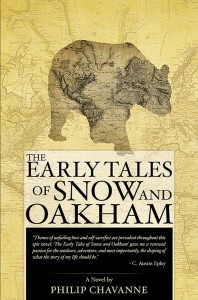 A sense of place is critical in engaging fiction. Oh, I suppose you could write some uomo senza nome-type landscape where characters interact in an unsubstantial vacuum. (Great dialogue, after all, can redeem a multitude of literary sins.) But the resulting book might not much connect with normal readers (though philosophers and critics of philosophers would no doubt love it). For us, however, no emotional attachment can be made to a character unless he, she, or it lives in a PLACE where we can picture ourselves setting our own feet.
A sense of place is critical in engaging fiction. Oh, I suppose you could write some uomo senza nome-type landscape where characters interact in an unsubstantial vacuum. (Great dialogue, after all, can redeem a multitude of literary sins.) But the resulting book might not much connect with normal readers (though philosophers and critics of philosophers would no doubt love it). For us, however, no emotional attachment can be made to a character unless he, she, or it lives in a PLACE where we can picture ourselves setting our own feet.
In a recent interview with Alaska magazine, Xulon author Philip Chavanne declares the importance of an immersive setting:
[T]he landscape played a vital role. An essential role. My hope all along was to write an adventure story that was both completely possible in every scene, and yet wild, dream-like, and enormous in its scope. I spent years trying to determine how to do that in the real world, and I eventually concluded that if it weren’t for the Alaska landscape such a story wouldn’t have been possible. The landscape is in many ways a character in itself.
Over the course of a quarter-million words, The Early Tales of Snow and Oakham takes readers on an epic journey around the world and back again. Every landscape—Alaska, Europe, Asia, India, Africa—is vividly drawn, and well they should be; Chavanne spent seven years traveling to all those places and chronicling the people and places he experienced. It is a story that almost literally defies description, a deeply affecting tale of forgiveness and redemption and destiny and what love looks like when you feel it with your entire being.
Have you trained as a writer?
When I was in college, I took screenwriting courses initially because I was passionate about storytelling and the idea of being a part of “the movies” was thrilling. However, I soon realized that screenwriting and fiction were two very different animals. I was far too stubborn and independent to hand over a story I’d bled for to a team of filmmakers. And my ability as a storyteller was far too limited to hold a reader’s attention for that long. So I focused my attention on learning the art of the short story. I enrolled in every course I could find on the subject, entered contests, and most importantly, I read short stories. I spent whole semesters reading and writing short stories. I soon learned that all good novels are simply culminations of good scenes. And I believed that if I could learn to write a good scene, just 7-10 pages that could hold a reader’s attention for every word, then I could in time build a prolonged narrative. So all of my training as a writer came in those early years of university courses, workshops, and my work with several writing mentors.
What were your inspirations for this particular story?
As far as inspirations go, Kanakuk Kamps was a place where I worked for three summers that radically changed my life and redirected my faith. It became undeniable that alongside my love for storytelling was an equal passion to work with children. So all of the elements of the book that have to do with children and caring for them with Christ’s love were inspired by Kanakuk Kamps. The other inspirations were from my travels.
Henry Snow and Jack Oakham have been a part of your life for a long time. What finally told you they were ready to meet the public?
The simplest answer was that I was finally finished. It took eleven years to write the book and another year for me to edit it, so I was ready to get it out there. But the simple truth was I had no idea how to do that. I manage a ranch in a small town, and when I need advice on a chainsaw I go to someone I trust about chainsaws and ask my questions. I have to trust that the person I’m dealing with knows one end of the chainsaw from the other and has cut down his share of trees. But with publishing, who do I turn to? I don’t know any novelists. I had no starting point , so I was literally in limbo. I could start submitting my book to random people I didn’t know, but for me that was like trusting a stranger with a chainsaw—someone was gonna get hurt.
I met Michelle Johnston in the Xulon Press booth at a ministry conference, spoke with her and submitted my prologue. Over the next few weeks, she read the book carefully and trust was established. My wife and I spoke on the phone with her about how we would move forward, and after some time in prayer, we decided it was time to move forward.
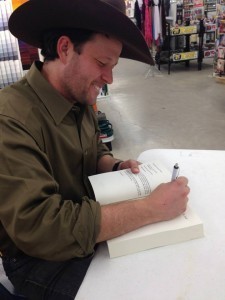
The author at the very first book signing for The Early Tales of Snow and Oakham
The publishing world has changed, is still changing, and many authors are shocked that writing the book is only the first, albeit the most important, part of the process. It’s been almost a year since your novel was published. Would you share what you’ve learned during the promotion and marketing phase of your work?
I’ve learned quite a bit. Once your book is complete, your work is not done. Now you have to tell your story and get the word out through social media and word of mouth. It can be hard work, but the rewards are crystal clear. I’ve also learned that what is more important than selling books is getting new readers and making them fans of your work. Readers talk about the books they’ve read, and it isn’t just for a few days after they finish. Oftentimes, it’s for many years. So while book sales are great, new fans do the work on the ground that no marketing plan ever could.
We’ve done several radio interviews and multiple book signings. We’ve been blessed that the book has been featured in half a dozen newspapers across the country, as well as Alaska Magazine. Last week [the first week of June 2014] the book became required reading in a high school in Colorado, so we will likely market to students in the future as well.
What should every first-time author know?
Read. That’s the first non-negotiable. Read the kind of books you would be proud to put your name on. Always explore something new.
When trying to write something magnificent, start small. Spend a whole day building One Great Sentence. Then you know you can. Now build a great paragraph. Then a great conversation. Ask yourself, “Who writes the best dialogue?” Read them and steal from them. They will be honored.
Be patient. Like a polaroid picture, good writing develops over time.
Phil’s interview with Alaska magazine can be read here. The Early Tales of Snow and Oakham will also be featured in Alaska’s July/August issue. His book is available from philipchavanne.com, as well as Amazon, Barnes and Noble, and the Xulon Press bookstore. Phil is always eager to connect with other writers, so feel free to reach out to him through social media or via his website, which also contains links to other appearances in the press.
Embrace your space.
The post Philip Chavanne’s The Early Tales of Snow and Oakham appeared first on Xulon Press, Christian Self Publishing.
July 25, 2014
There are NO EXCUSES
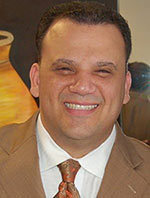 My name is Peter Lopez and I just published my first book titled Excuses, Excuses, Which One is Yours? I work as a Publishing Consultant for Xulon Press, but writing a book is what has been in my heart for over twenty years. Because my book is centered on people that make excuses, the damage it does to one’s life, and how to live an excuse-free life, I have become aware of my own excuses and the lies I have told myself that I chose to believe. The more research I did on the subject, the fewer excuses I was making in my everyday life and the more ready I was to write my book. So I took a step forward in faith and began writing.
My name is Peter Lopez and I just published my first book titled Excuses, Excuses, Which One is Yours? I work as a Publishing Consultant for Xulon Press, but writing a book is what has been in my heart for over twenty years. Because my book is centered on people that make excuses, the damage it does to one’s life, and how to live an excuse-free life, I have become aware of my own excuses and the lies I have told myself that I chose to believe. The more research I did on the subject, the fewer excuses I was making in my everyday life and the more ready I was to write my book. So I took a step forward in faith and began writing.
I prayed that my book would help those who read it, but I did not expect it to speak to me during the publishing process. Now here’s the kicker: I have worked with and even published hundreds of authors, but I have spoken to thousands upon thousands of would-be authors and that is the hardest part about my job. In one call there is the “thrill of victory” and with the next call, there is “the agony of defeat.” Whether it’s pride, insecurity, doubt, or fear, despite my reassurances about our author coaching, payment plans, and editorial services, they still come up with excuses. The difference between people that actually publish a book and the people that only want to publish a book is that the ones who do publish refuse to give into their fear and anxiety. They don’t swallow it, they don’t rest on it, and they sure don’t dance to it.
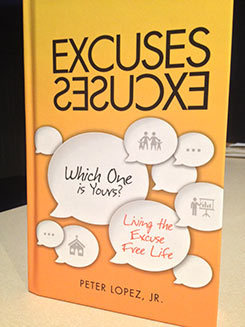 We are always here to encourage you, but sometimes we need to push you toward your destiny and today is that day! Even if you haven’t written a letter, call us and let us guide you; even if you have no money, there are no excuses; we have published thousands of authors with a no-interest payment plan. Even if you think you’re not a great writer, so what? We can edit your book. I had mine edited nearly one hundred times! I refused to allow my excuses to hold me down. There are reasons and there are excuses, but how long will you hold on to both?
We are always here to encourage you, but sometimes we need to push you toward your destiny and today is that day! Even if you haven’t written a letter, call us and let us guide you; even if you have no money, there are no excuses; we have published thousands of authors with a no-interest payment plan. Even if you think you’re not a great writer, so what? We can edit your book. I had mine edited nearly one hundred times! I refused to allow my excuses to hold me down. There are reasons and there are excuses, but how long will you hold on to both?
I humbly and proudly say that my book has been out for a month as I write this and I appreciate the process of publishing a book more than ever. If you have ever desired to write a book, then write it, publish it, and when you hold it in your hands, you realize your dream has come true. Childbirth is a painful event for a mother, but it all goes away when she holds her precious baby. Thankfully, publishing is not nearly as painful as childbirth, but the concept is the same. It will require a lot out of you, but once you hold that book in your hands and that book has your name on the cover, it all becomes worth it.
There are no excuses!
Find Peter’s book Excuses Excuses Which One is Yours? – Living the Excuse Free Life on the Xulon Press Bookstore or visit his site at www.peterlopezjr.com.
The post There are NO EXCUSES appeared first on Xulon Press, Christian Self Publishing.
Xulon Press Blog
- Peter Lopez Jr.'s profile
- 8 followers


